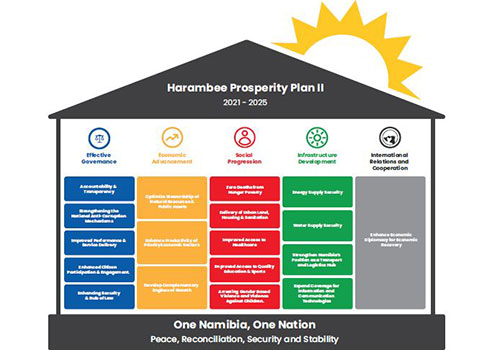The Harambee Prosperity Plan II (HPP II) covers 2021 to 2025 and builds on the solid foundation of the inaugural HPP 2016-2020. It continues to prioritise the implementation of targeted policy programmes in order to enhance service delivery, contribute to economic recovery and engender inclusive growth. HPP II aims to ensure Namibia is poised to respond to domestic socioeconomic challenges and global opportunities, during and after the Covid-19 pandemic.
The formulation of HPP II involved a process of extensive literature review, workshops with subject matter experts and countrywide stakeholder consultations including the 2019 town hall meetings. The baseline for these consultations was the HPP Final Report (2016-2020) and contemporary developmental issues.
The HPP II remains a targeted impact plan, consisting of prioritised short to medium term goals and strategic actions to accelerate national development towards Vision 2030 and prosperity for all.
The HPP II retains the five pillars, namely:
Pillar 1: Effective governance
Pillar 2: Economic advancement
Pillar 3: Social progression
Pillar 4: Infrastructure development
Pillar 5: International relations and cooperation
The HPP pillars remain firmly anchored on the construct of an inclusive Namibian House, built on the solid foundation of peace, stability and the rule of law.
Pillar Five: International relations and cooperation
Under HPP I, the government undertook to ensure that Namibia continues to be a respectable and trusted member of the international community by honouring its obligations and for the international community to support its efforts of translating political independence into economic independence. These goals were pursued through various strategies, thereby enabling the country to gain global respect and raising its diplomatic profile, especially at the multilateral level. To buttress the successful execution of the foreign policy strategy and a growing diplomatic profile, Namibia serves on several continental and global initiatives, including the High-Level Panel on the Sustainable Ocean Economy and the Africa Renewable Energy Initiative (AREI).
The destiny of Namibia is interwoven with that of Africa and the country continues to actively participate in regional and continental integration processes through Agenda 2063: The Africa We Want and its goal of achieving “An Integrated, Prosperous and Peaceful Africa, driven by its own citizens and representing a dynamic force in the global arena”.
Namibia is part of the global community and therefore not immune to transnational threats and global challenges, including the Covid-19 pandemic. Covid-19 has eroded some of the gains of HPP I and NDPs. During this period of global uncertainty, the way forward requires new ways of working and tangible actions to ensure economic survival. This notwithstanding, commerce and trade remain integral to the success of nations. The key challenge for Namibia’s economic diplomacy is to devise meaningful ways to strengthen the commercial and trading position of the government for economic recovery.
To this end, Namibia will optimise its diplomatic footprint across the five continents by placing greater emphasis on economic interests, as embodied in the Policy on International Relations & Cooperation. Economic diplomacy will also have to address the structural challenges and vulnerabilities posed by the Covid-19 pandemic to the domestic economy and the integration of the country into global value chains.
Namibia’s economic diplomacy strategy is based on an integrated approach of bilateral, regional and multilateral diplomacy and cooperation, with the aim of growing exports and investment activities related to exports. On all the above, the Foreign Service is indispensable to the attainment of an increase and expansion of exports and the deepening of commercial interests with other countries.
This pillar has one goal comprised of six activities, namely:
1. Operational adaptation: Working as one
2. Enhancing conditions for prosperity
3. Optimising regional integration
4. African economic integration
5. Bilateral cooperation
6. Targeted multilateral diplomacy
The International Relations and Cooperation pillar under HPP I was implemented under difficult conditions. Similarly, its implementation under the HPP II will, unfortunately, be implemented under more challenging conditions with Covid-19 posing grave risks to the economic growth agenda of the past six years. This implies bolder and urgent execution of plans through better prioritisation and “doing more with less”. In continuity with HPP I, and in light of the emergent challenges, pillar five will continue to harness Namibia’s diplomacy in favour of economic recovery and growth.
Situation analysis
The strength and foundation of our economic diplomacy rests at the national level. The objective of national development, which is at the centre of economic diplomacy is described and outlined in Vision 2030 and the successive NDPs, the Growth at Home Strategy, the Policy on International Relations and Cooperation, the Swapo Party manifesto and various other policy statements and legal frameworks put in place since 1990. In leveraging our economic diplomacy, critical sectors in the green economy, mining, tourism, information and communication technology and the blue economy will be reprioritised in order to create employment opportunities for sustained economic
growth.


